Stay Updated with Everything about MDS
Thank you! Your submission has been received!
Oops! Something went wrong while submitting the form.
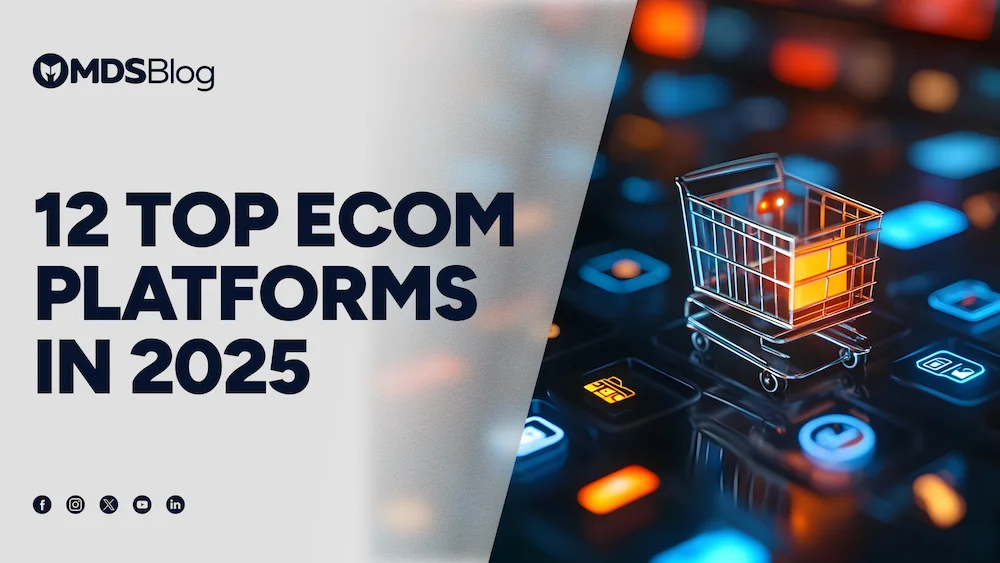
Chilat Doina
November 19, 2025
Selecting the right ecommerce platform is a foundational decision that directly impacts your ability to sell, market, and manage your operations. Choosing a system that doesn't align with your business model can create significant friction, leading to lost revenue, complex data migrations, and a ceiling on your growth potential. This is a choice that defines your operational agility and customer experience for years to come.
This guide is designed to help you make that crucial decision with confidence. We move past surface-level feature lists to offer a comprehensive analysis of the best ecommerce platforms for small business, viewed through the lens of real-world use cases. You won't find generic marketing copy here. Instead, you'll get a detailed breakdown of each platform's strengths, weaknesses, and ideal user profile.
We will explore options tailored for specific needs, including:
Each platform review includes a deep dive into its core capabilities, pricing structures, and scalability, complete with screenshots and direct links to help your evaluation. Our goal is to provide a clear, strategic framework that helps you select a platform that not only serves your business today but also supports your long-term vision for growth. This resource is your blueprint for choosing the right engine for your online store.
Shopify is arguably the most recognizable name in ecommerce, earning its top spot by offering a powerful, all-in-one hosted solution that excels in ease of use and scalability. It is one of the best ecommerce platforms for small businesses aiming for a rapid launch without sacrificing the power needed for future growth. The platform handles all the technical heavy lifting, from security to hosting, allowing you to focus on building your brand and selling products.
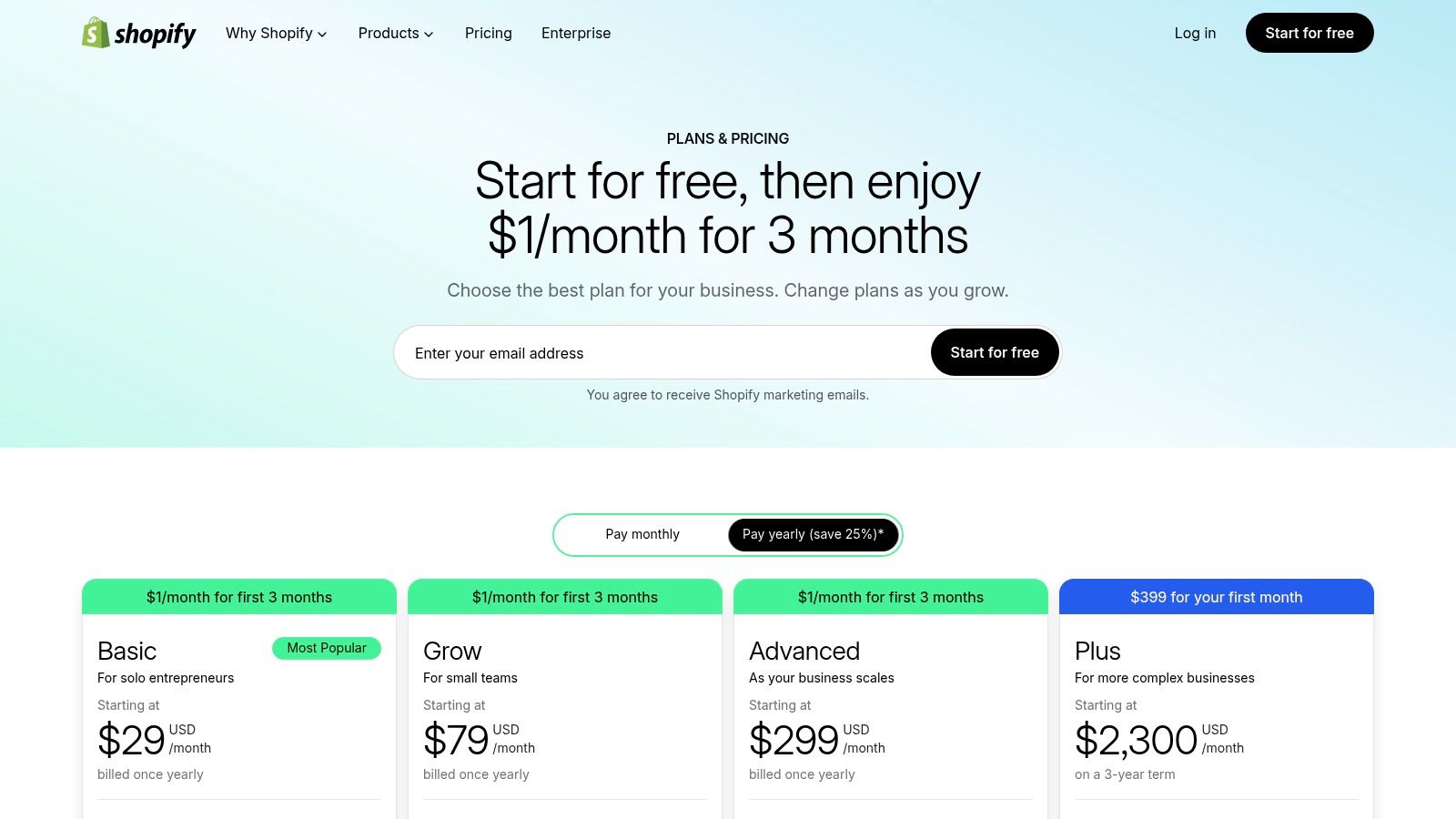
Its core strength lies in its world-class checkout experience, which is heavily optimized for conversion. Combined with Shopify Payments, its native payment gateway, it provides a seamless transaction process for customers. For businesses already selling on other marketplaces, Shopify offers robust tools to unify operations. For example, brands that started on Amazon can leverage Shopify to build a direct-to-consumer channel. You can find more details on how to integrate Shopify with your Amazon strategy.
FeatureDetailsPricingStarts at $29/month for the Basic plan, with Advanced and Shopify Plus tiers available for scaling businesses.Ideal ForDTC startups, omnichannel retailers, and Amazon sellers expanding into their own storefronts.Key DifferentiatorThe extensive App Store, allowing for limitless customization and functionality additions.Omnichannel SellingNative integrations with Facebook, Instagram, TikTok, Google Shopping, and a powerful POS system.
Website: https://www.shopify.com/pricing
BigCommerce is a powerful, hosted ecommerce platform that stands out by offering a rich set of built-in features, making it one of the best ecommerce platforms for small businesses that want advanced functionality out of the box. Unlike many competitors, it doesn’t charge its own transaction fees, allowing you to focus on scaling your business without worrying about an extra percentage cut from your revenue. It's a top choice for merchants who manage both B2C and B2B operations from a single dashboard.
The platform's core strength is its impressive feature set that comes standard with every plan, including advanced SEO tools and robust product filtering. This focus on native capability reduces the need to rely on third-party apps, which can simplify management and keep monthly costs predictable. For businesses serious about omnichannel retail, BigCommerce offers native integrations with major marketplaces like Amazon and eBay, as well as social channels like Facebook and Instagram, making it easy to manage sales across multiple fronts.
FeatureDetailsPricingStarts at $25/month for the Standard plan when paid annually, with Plus, Pro, and Enterprise tiers.Ideal ForB2B/B2C hybrid stores, merchants with large or complex product catalogs, and businesses wanting to minimize app dependency.Key DifferentiatorNo platform transaction fees and an extensive suite of native features included in all plans.Omnichannel SellingStrong direct integrations with Amazon, eBay, Walmart, Google Shopping, Facebook, and Instagram.
Website: https://www.bigcommerce.com/pricing
Wix has evolved from a simple website builder into a robust ecommerce contender, making it one of the best ecommerce platforms for small businesses that prioritize design flexibility and creative control. It’s ideal for entrepreneurs who want a visually stunning store without needing to touch a line of code. The platform’s drag-and-drop editor is its star feature, offering an intuitive way to build a unique, branded storefront from the ground up or by using one of its hundreds of templates.
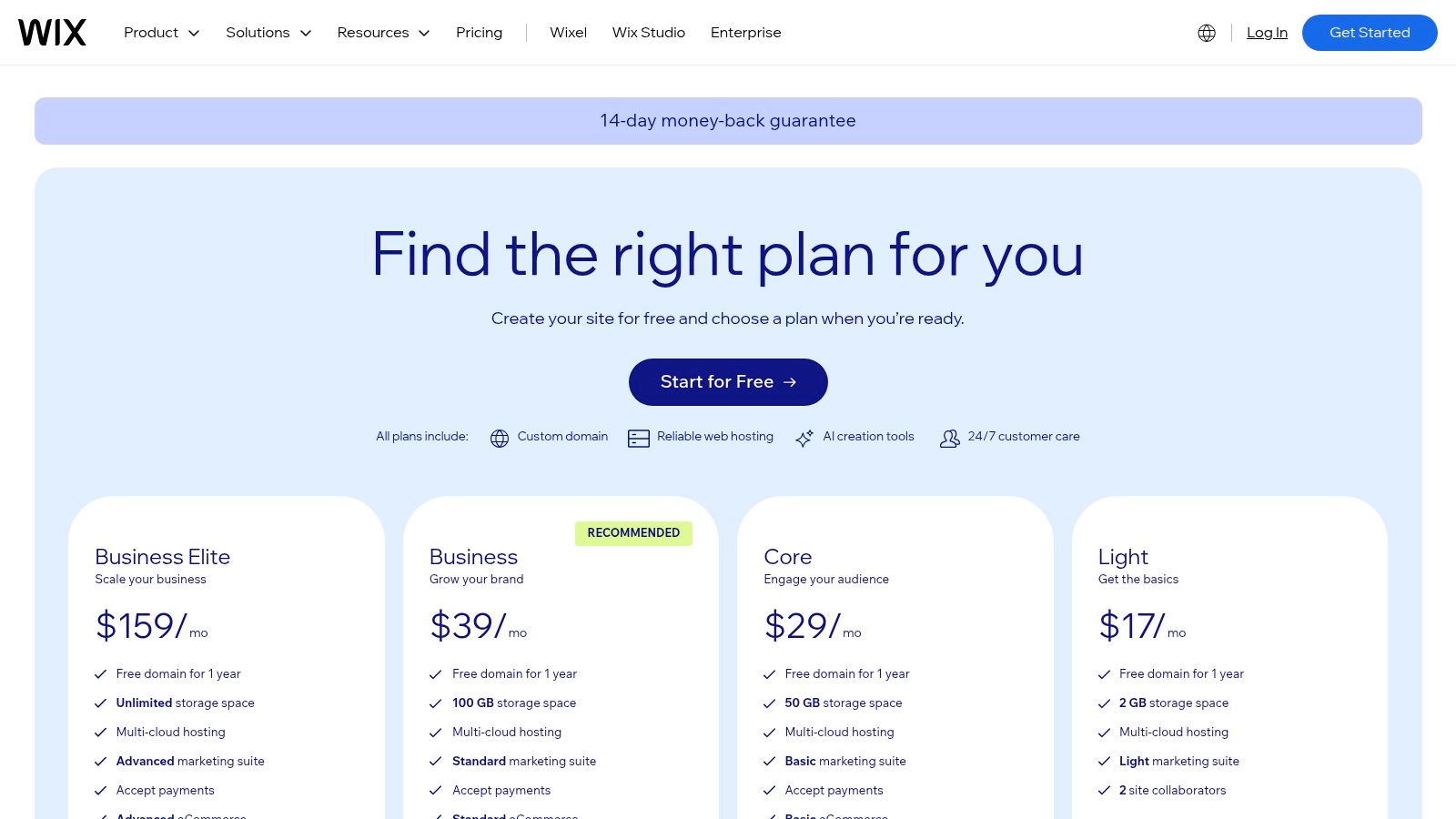
Its core strength lies in combining an easy-to-use site builder with a comprehensive suite of business tools. Wix offers built-in SEO features, marketing automations for tasks like abandoned cart recovery, and a growing App Market to add extra functionality. This makes it a great choice for business owners who want a single platform to manage their online presence, from the storefront design to their email marketing campaigns, all within one unified dashboard.
FeatureDetailsPricingeCommerce plans start around $27/month (Core plan), with Business and Business Elite tiers for more advanced features.Ideal ForCreative entrepreneurs, artists, and small businesses focused on strong visual branding and design flexibility.Key DifferentiatorThe highly intuitive drag-and-drop visual editor and extensive library of over 900 professionally designed templates.Omnichannel SellingIntegrations for selling across social media platforms like Facebook and Instagram, as well as marketplaces like Amazon.
Website: https://www.wix.com/upgrade/website
Squarespace is a design-forward hosted platform that has evolved into a robust commerce solution, ideal for brand-centric businesses that prioritize aesthetics and content. It is one of the best ecommerce platforms for small businesses where the brand story and visual presentation are just as important as the products themselves. The platform offers an all-in-one package, combining stunning templates, powerful content creation tools, and integrated commerce features into a single, intuitive interface.
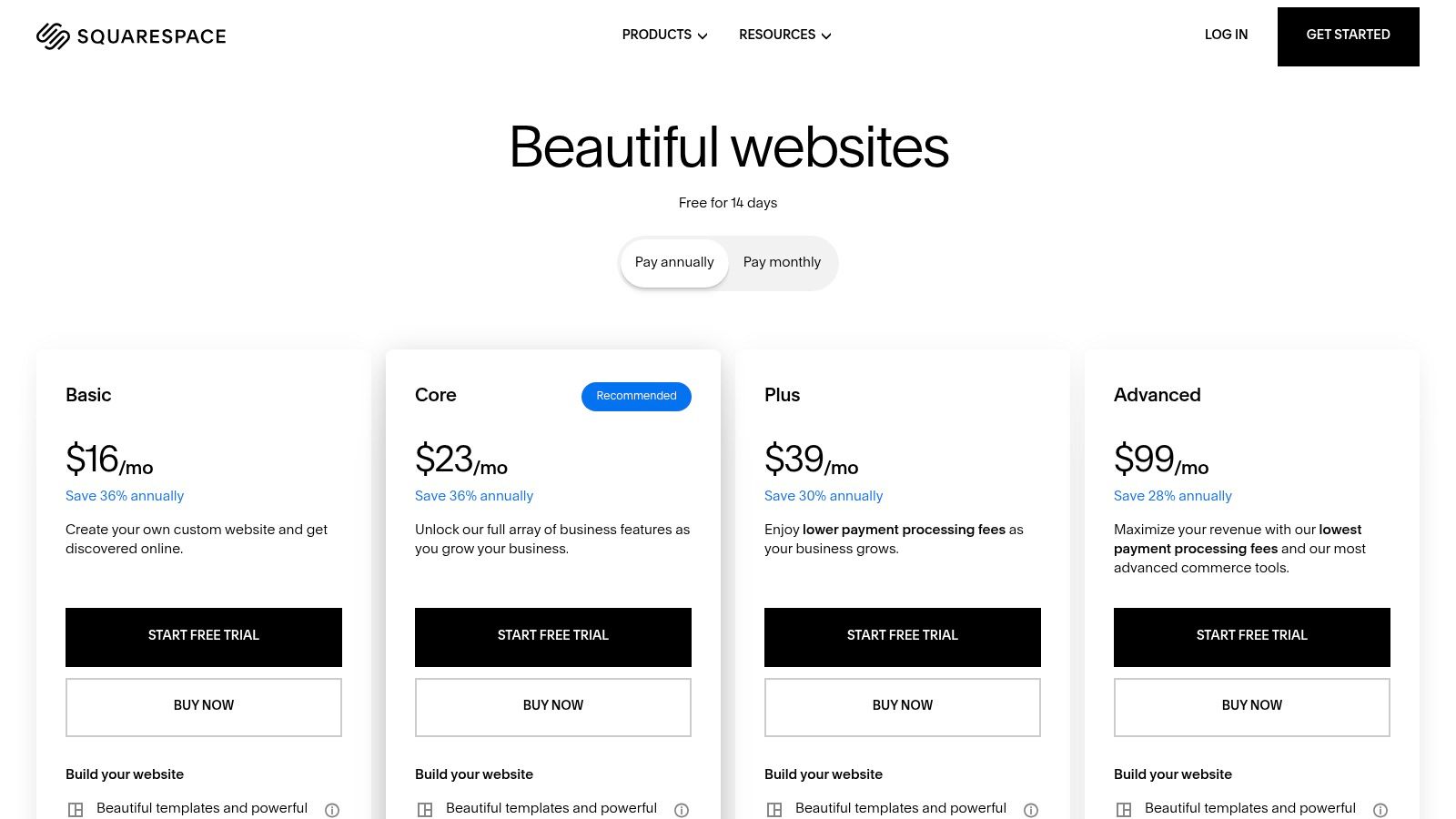
Its core strength is its beautiful, award-winning templates and the highly flexible Fluid Engine drag-and-drop editor, which gives creators precise control over their site's layout without needing to code. Squarespace excels for businesses selling digital products, subscriptions, or services, as these tools are natively integrated. Built-in email marketing, scheduling, and analytics tools further simplify operations, allowing business owners to manage their online presence from one central dashboard.
FeatureDetailsPricingBusiness plan starts at $23/month (billed annually) with a 3% transaction fee; Commerce plans start at $27/month with 0% fees.Ideal ForCreative entrepreneurs, artists, service-based businesses, and brands focused on premium design and content marketing.Key DifferentiatorSuperior template design and an all-in-one toolset that seamlessly integrates content, marketing, and commerce.Omnichannel SellingIntegrates with Instagram Shopping and Facebook Shops; offers a point-of-sale solution through a Square reader partnership.
Website: https://www.squarespace.com/pricing
Square Online leverages its dominance in point-of-sale (POS) systems to offer an ecommerce solution that’s perfect for brick-and-mortar businesses venturing online. Its key strength is the seamless, unified ecosystem it creates between in-person and digital sales. For small retailers, cafes, and service-based businesses already using Square for payments, this is one of the best ecommerce platforms for small business because it synchronizes inventory, orders, and customer data automatically across all channels.
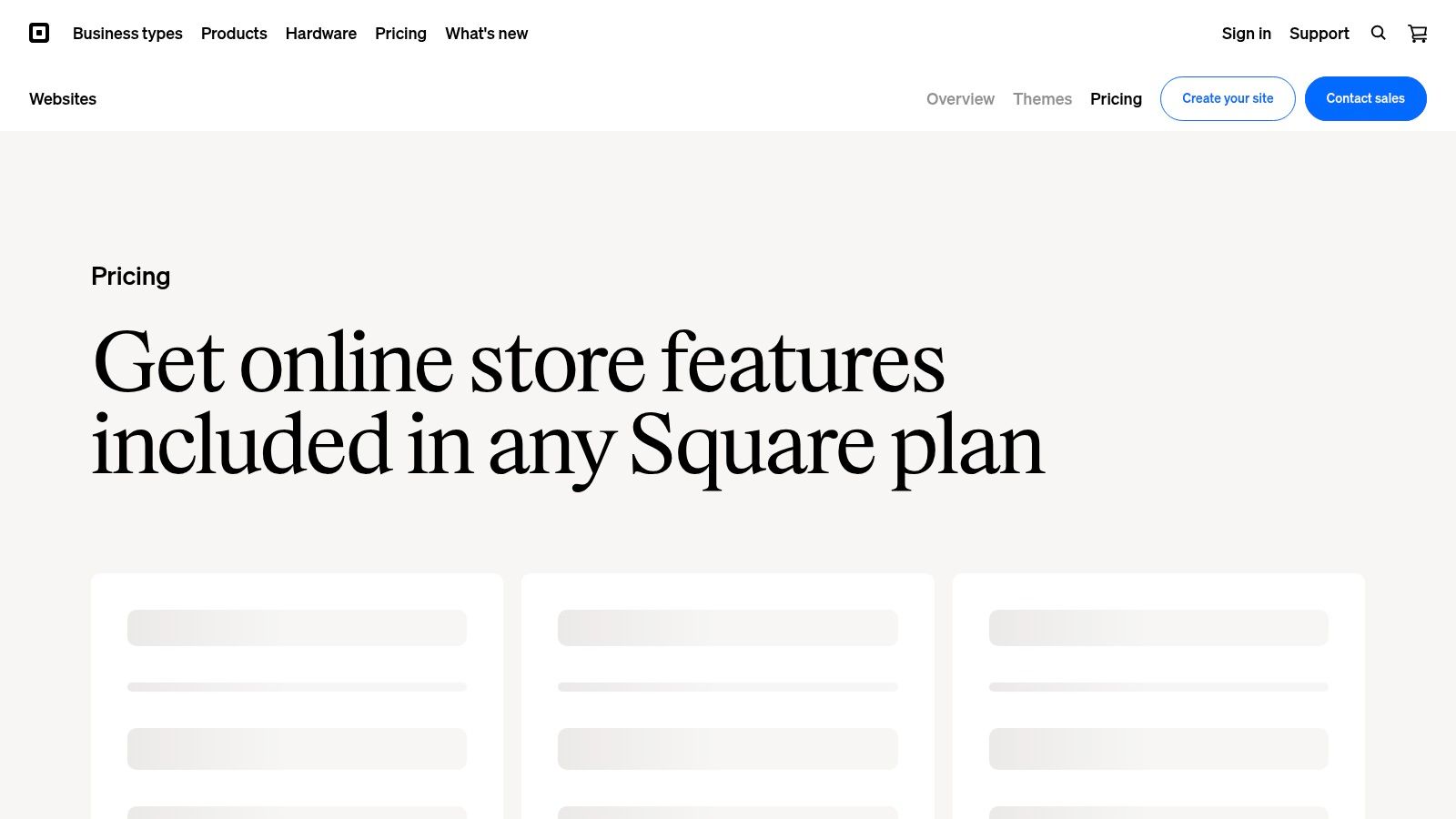
The platform is designed for rapid deployment, allowing merchants to launch a functional online store with minimal effort. It includes features tailored for local businesses, such as in-store pickup, local delivery, and appointment booking. By integrating tools like text message marketing and flexible payment options like Afterpay and Cash App Pay, Square Online provides a modern, customer-friendly experience without the complexity of other platforms.
FeatureDetailsPricingStarts with a free plan. Paid plans (Plus, Premium) unlock advanced features and lower processing rates.Ideal ForBrick-and-mortar retailers, restaurants, and service providers already using or planning to use Square POS.Key DifferentiatorNative, deep integration with the entire Square ecosystem (POS, Invoices, Marketing, Payroll).Omnichannel SellingUnified inventory and order management for online, in-person, and social media sales channels.
Website: https://squareup.com/us/en/online-store/plans
For businesses that want ultimate control and ownership over their digital storefront, WooCommerce is the undisputed open-source champion. It’s not a standalone platform but rather a powerful, free plugin that transforms any WordPress website into a fully functional ecommerce store. This approach makes it one of the best ecommerce platforms for small businesses that prioritize customization and content-driven commerce, as it seamlessly integrates with the world’s leading content management system.
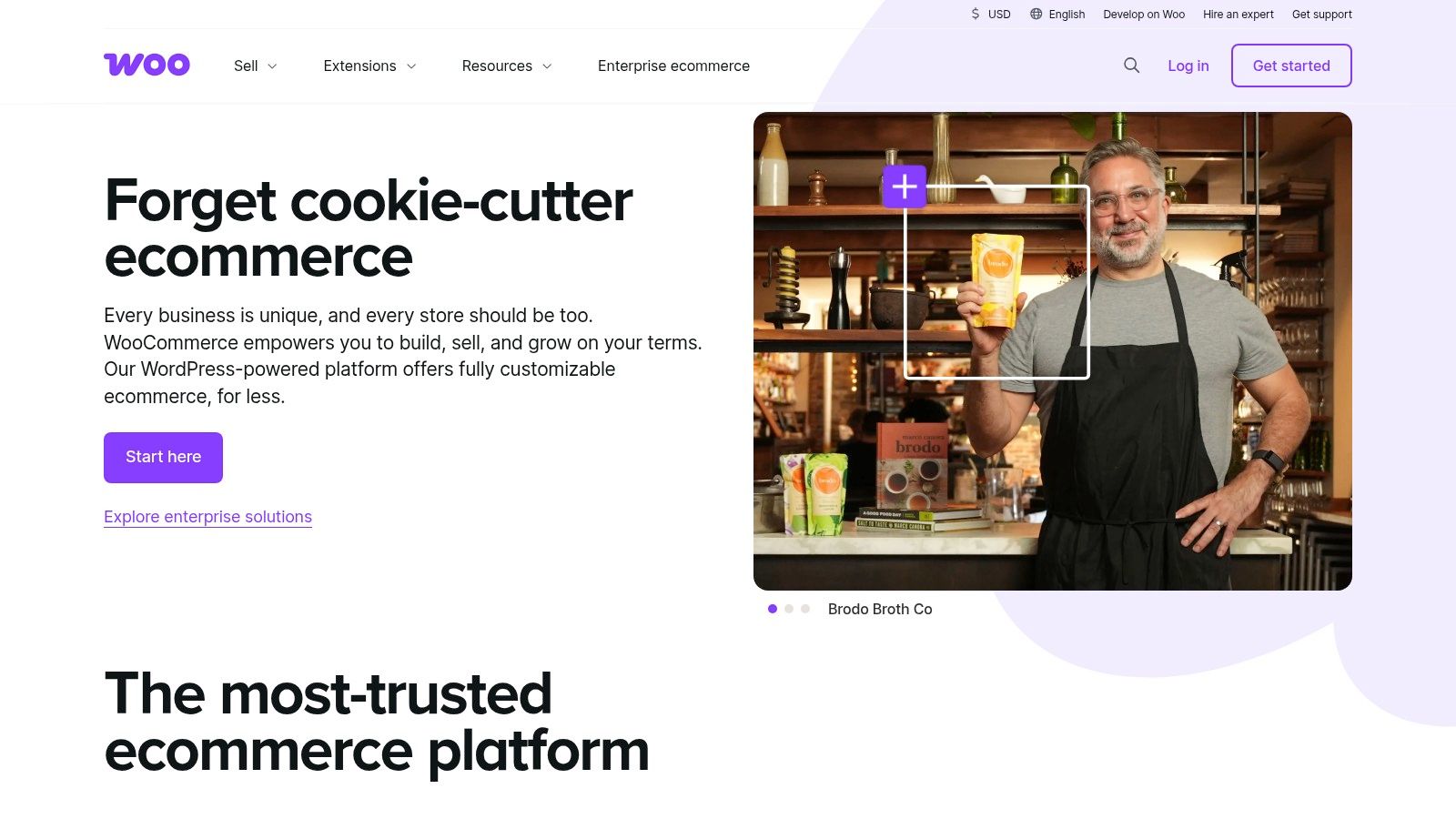
Its core strength is unparalleled flexibility. Since you manage your own hosting, you have complete freedom over your store's environment, data, and functionality. For small businesses with complex shipping needs or regulated products, WooCommerce's extensibility shines; for instance, you can explore the best shipping restriction plugins for WooCommerce to handle these challenges effectively. To simplify setup, Woo Express now offers a hosted solution, bundling hosting and maintenance for an easier entry point.
FeatureDetailsPricingThe core plugin is free. Costs come from hosting, themes, and paid extensions. Woo Express hosted plans start at $39/month.Ideal ForContent-heavy brands, budget-conscious startups, and businesses with unique technical or customization needs.Key DifferentiatorComplete ownership and infinite customization potential as an open-source plugin for WordPress.Omnichannel SellingAchieved through a vast ecosystem of extensions for marketplaces like Amazon, eBay, and social media channels.
Website: https://woocommerce.com
Ecwid by Lightspeed carves out a unique niche by not forcing you to build a new website from scratch. Instead, it offers a powerful and embeddable ecommerce widget that can be added to any existing site, whether it's WordPress, Wix, or a custom-coded page. This "add-a-store" approach makes it one of the best ecommerce platforms for small businesses that already have an online presence and want to start selling quickly without a complete website overhaul.
Its primary strength lies in its flexibility and focus on multi-channel selling. You can simultaneously sell on your website, social media platforms like Facebook and Instagram, and even marketplaces like Amazon and eBay, all managed from a single dashboard. This makes it an excellent choice for artists, bloggers, or local businesses looking to monetize an existing audience across various channels with minimal technical friction.
FeatureDetailsPricingIncludes a free-forever plan for up to 5 products. Paid plans start at $19/month (billed annually) for more features.Ideal ForBloggers, artists, and small businesses with an existing website looking to add ecommerce functionality.Key DifferentiatorThe ability to embed a full-featured store on any website or social media profile with just a few lines of code.Omnichannel SellingStrong native integrations for selling directly on Instagram, Facebook, TikTok, Amazon, and eBay.
Website: https://www.ecwid.com/pricing
Shift4Shop, formerly known as 3dcart, presents a compelling offer for U.S.-based merchants with its feature-rich, all-in-one hosted solution. It stands out by providing a potentially free, enterprise-grade platform, making it one of the best ecommerce platforms for small businesses operating on a tight budget. The platform's End-to-End Ecommerce plan waives the monthly platform fee entirely for qualifying merchants who use Shift4 as their payment processor, bundling hosting, a domain, and an SSL certificate at no extra cost.
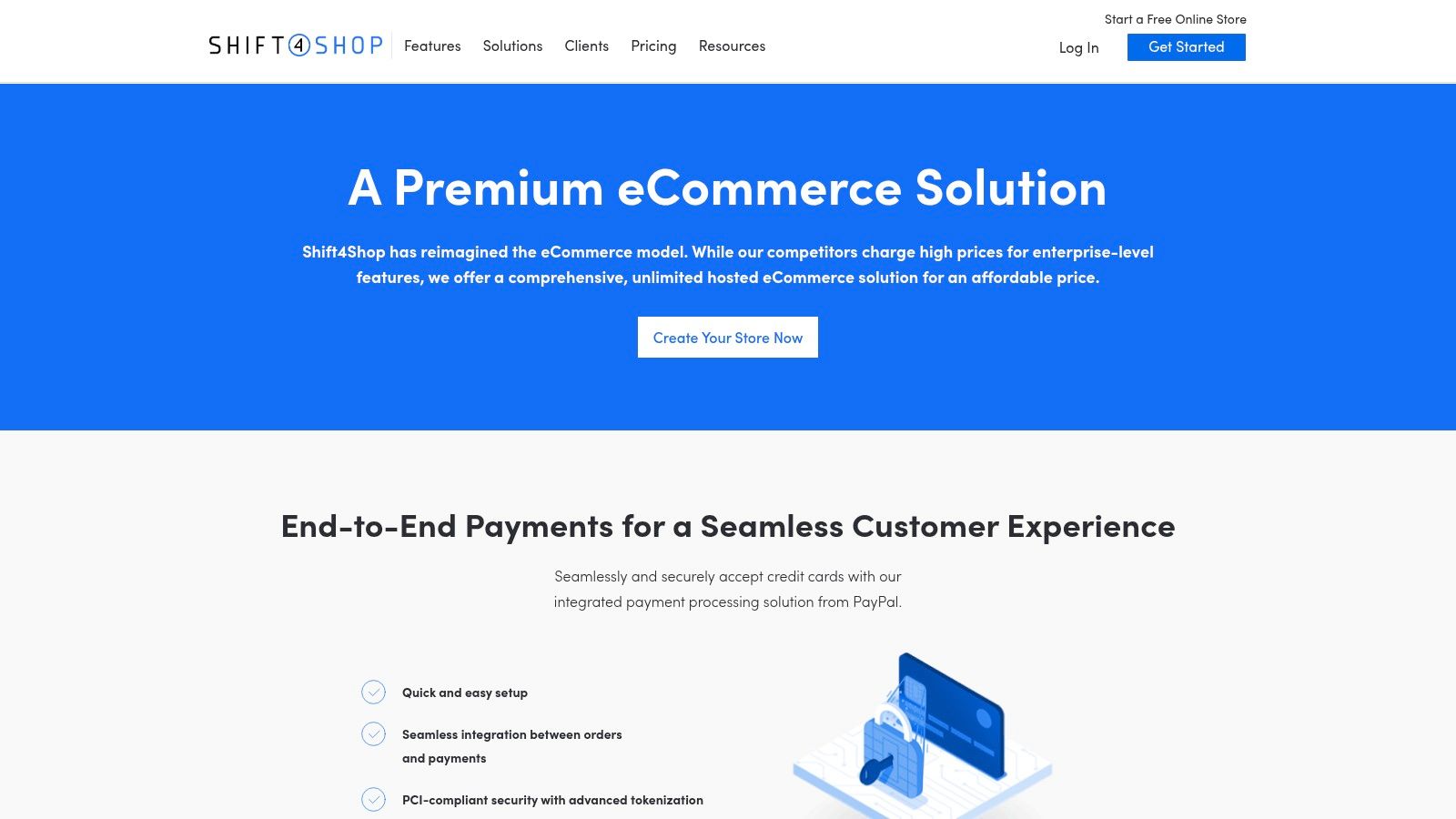
Its core strength is the sheer number of features included out of the box. Unlike platforms that rely heavily on third-party apps, Shift4Shop provides native functionality for CRM, returns management (RMA), a built-in blog, real-time shipping calculations, and advanced B2B catalog tools. This approach can significantly reduce the total cost of ownership for businesses that would otherwise spend hundreds on monthly app subscriptions to get similar capabilities.
FeatureDetailsPricingEnd-to-End Ecommerce plan is free for U.S. merchants using Shift4 Payments; paid plans available otherwise.Ideal ForBudget-conscious U.S. SMBs, B2B sellers, and businesses wanting extensive built-in features.Key DifferentiatorThe potentially $0 platform fee via its End-to-End plan, which includes enterprise-level features.Omnichannel SellingIntegrations for selling on marketplaces like Amazon, eBay, and social channels like Facebook.
Website: https://www.shift4shop.com/end-to-end-plan.html
GoDaddy is widely known for domain registration and hosting, but its Online Store builder offers a streamlined entry point into ecommerce. It integrates a website builder, marketing tools, and payment processing into a single, user-friendly dashboard. This platform is one of the best ecommerce platforms for small businesses that prioritize simplicity and speed to market, especially for those already using other GoDaddy services like domains or professional email.
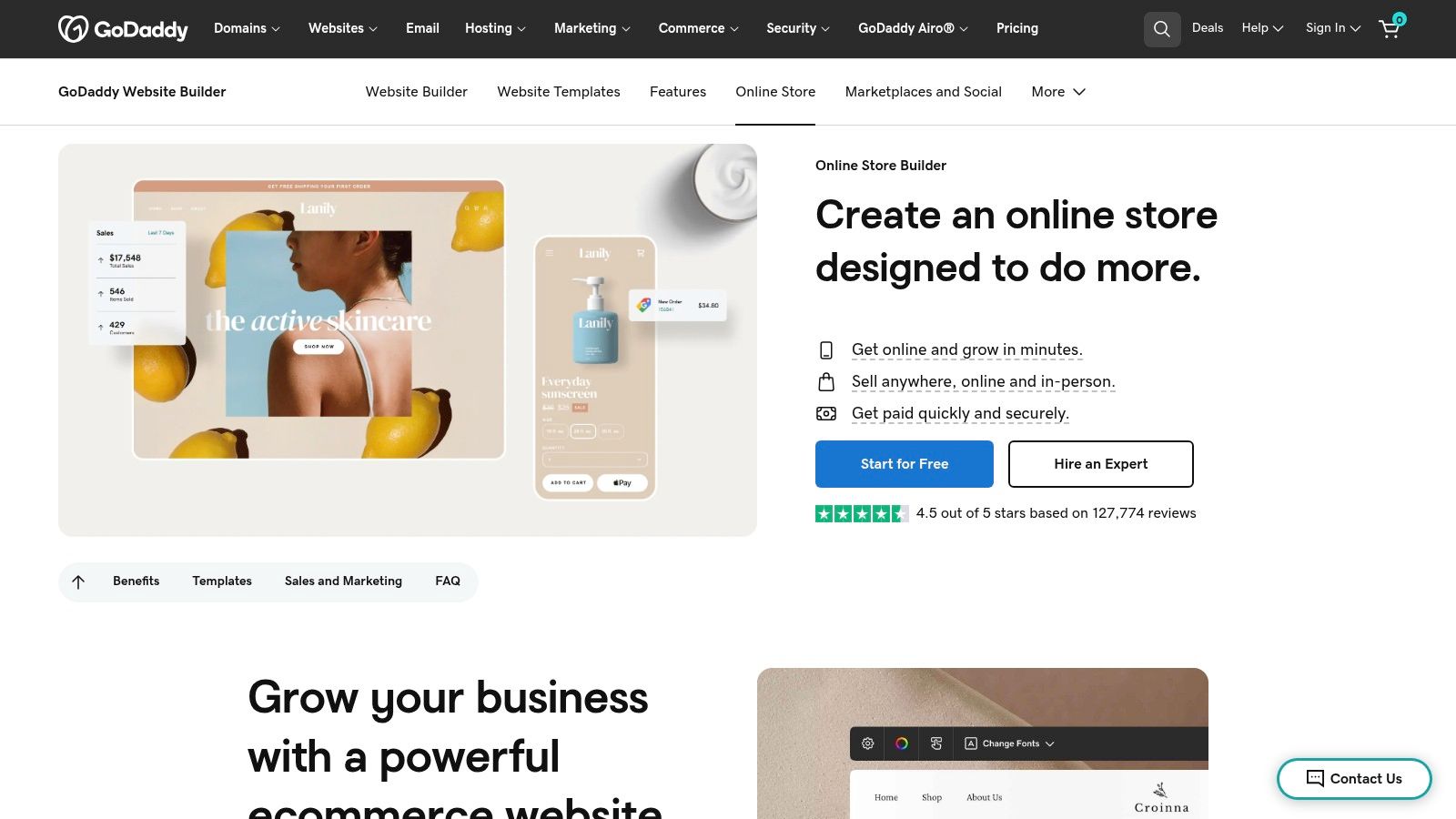
Its core advantage is the all-in-one ecosystem. You can build your store for free and only upgrade when you're ready to sell, making it a low-risk option. The platform supports a surprisingly large number of products and includes native marketplace integrations with giants like Amazon and eBay, allowing you to manage listings from one central hub. With GoDaddy Payments and an included SSL certificate, it covers the essentials needed to get a simple store online quickly and securely.
FeatureDetailsPricingA free plan is available to build your site; paid Commerce plans are required to sell, starting around $16.99/month.Ideal ForService providers adding products, entrepreneurs wanting an ultra-fast setup, and existing GoDaddy customers.Key DifferentiatorA unified dashboard that combines a site builder, marketing tools, marketplace sync, and payments in one place.Omnichannel SellingDirect integrations with Amazon, Etsy, eBay, Facebook, and Google Shopping from a central dashboard.
Website: https://www.godaddy.com/websites/online-store
PrestaShop is an open-source ecommerce solution that offers unparalleled control and customization for businesses willing to manage their own hosting. Its free "Classic" version is a powerful starting point, making it one of the best ecommerce platforms for small businesses that prioritize budget flexibility and technical freedom. This self-hosted model allows merchants to build a truly bespoke online store without recurring platform subscription fees.

The platform's core strength lies in its extensive module marketplace and a large, active global community. This ecosystem provides a vast array of add-ons for payments, marketing, and logistics, enabling you to add complex functionality as your business grows. For those who prefer a more hands-off approach, PrestaShop also offers Hosted and Enterprise options that include hosting, setup, and dedicated support, bridging the gap between open-source flexibility and a managed service.
FeatureDetailsPricingThe Classic software is free to download; costs are associated with hosting, modules, and developer support. Hosted plans are also available.Ideal ForTech-savvy entrepreneurs, businesses on a tight budget, and international merchants needing multilingual/multicurrency features.Key DifferentiatorNo license fee for its powerful open-source version, giving merchants complete ownership and control over their store.CustomizationNearly every aspect of the platform can be modified through its code, themes, and thousands of available modules.
Website: https://prestashop.com/en/download
While not a platform itself, G2 is an indispensable research tool for any business owner in the process of choosing a new ecommerce solution. It’s a crowd-sourced review platform that provides unbiased, real-world user feedback on hundreds of software products. For anyone overwhelmed by marketing claims, G2 offers a data-driven way to validate options and see how platforms perform for businesses of a similar size and scope.
G2 is one of the best ecommerce platforms research tools because it aggregates thousands of reviews and presents them in easy-to-digest formats like their proprietary Grid® reports. These grids visually map out market leaders, contenders, and niche players based on user satisfaction and market presence. This allows you to quickly shortlist top contenders and dive deeper into specific reviews to understand their strengths and weaknesses from an actual user's perspective, moving beyond vendor promises.
FeatureDetailsPricingFree to access reviews and comparison tools.Ideal ForAny business in the evaluation phase of selecting an ecommerce platform or related software.Key DifferentiatorAuthentic, verified user reviews and data-driven comparison grids that cut through marketing hype.Core Tools'Best Commerce Software Products' lists, leader grids, and filters by business size, features, and ratings.
Website: https://www.g2.com/categories/e-commerce-platforms
While not a platform itself, NerdWallet's guide to online store builders is an invaluable resource for research and comparison. It earns a spot on this list for its clear, U.S.-focused editorial comparisons that help small business owners make informed decisions. This guide is one of the best ecommerce platforms for small business resources because it demystifies complex pricing structures and feature sets, presenting them in an easy-to-digest format. It provides practical, scannable guidance tailored to the needs of new entrepreneurs.
The core strength of this resource is its "best for" recommendations, which match specific platforms to common business needs like B2B, omnichannel, or starting for free. This use-case-driven approach simplifies the selection process, allowing you to quickly shortlist options that align with your business model. For founders looking at the bigger picture, pairing this guide with strategies on how to grow online sales can provide a powerful roadmap from platform selection to scaling revenue.
FeatureDetailsPricingFree to access the guide and all comparison content.Ideal ForSmall business owners in the initial research phase seeking unbiased, practical platform comparisons.Key DifferentiatorConcise, use-case-based recommendations ("best for" picks) and clear summaries of pricing and fees.Platform ComparisonsFeatures easy-to-scan summaries, links to detailed reviews, and direct links to vendor pages for trials.
Website: https://www.nerdwallet.com/business/software/learn/online-store-builders
PlatformCore strengths (✨)Target audience (👥)UX / Quality (★ / 🏆)Value / Pricing (💰)Shopify✨ Hosted storefront, world‑class checkout, POS & multichannel 🏆👥 DTC + scaling merchants★★★★★ 🏆 (conversion & apps)💰 Tiered plans; app/add‑on costs; platform fee for 3rd‑party paymentsBigCommerce✨ Strong native features, headless & multi‑storefront 🏆👥 SMB → mid‑market omnichannel & B2B★★★★☆ 🏆 (robust built‑ins)💰 Higher base price; no extra platform fees, annual caps applyWix eCommerce✨ Visual editor, 900+ templates, AI design👥 Small brands prioritizing design & speed★★★☆☆ (easy visual customization)💰 Free start; advanced ecommerce on higher tiersSquarespace (Commerce)✨ Design‑forward templates, content + commerce👥 Brand‑driven stores & creators★★★★☆ 🏆 (premium design/UI)💰 No permanent free plan; mid‑to‑high tier pricingSquare Online (Square)✨ Unified POS + online sync, fast payouts👥 Small retailers & restaurants using Square★★★☆☆ (seamless in‑person + online)💰 True free tier; paid plans add marketing/featuresWooCommerce + Woo Express✨ Open‑source flexibility; huge extension ecosystem 🏆👥 Merchants wanting full control & ownership★★★★★ 🏆 (scalable with dev)💰 Free core; hosting, extensions & dev costs varyEcwid by Lightspeed✨ Embeddable store, social integrations👥 Small catalogs, social sellers★★★☆☆ (fast deploy)💰 Affordable basic tiers; advanced features on paid plansShift4Shop (3dcart)✨ Many native ecommerce features; End‑to‑End plan👥 Budget‑minded SMBs & B2B catalogs★★★★☆ (feature‑rich)💰 Potential $0 platform fee if using Shift4 Payments (US)GoDaddy Online Store✨ Quick setup, marketplace sync & domain tools👥 Simple stores; domain‑centric SMBs★★★☆☆ (fast & simple)💰 Build free then upgrade; limited advanced featuresPrestaShop (Classic / Hosted / Enterprise)✨ Open‑source modular platform, modern admin👥 Self‑hosted merchants needing customization★★★★☆ (flexible with dev)💰 Free Classic; hosting, modules & dev add costG2 (E‑Commerce Platforms)✨ Crowd reviews, leader grids & trend reports 🏆👥 Buyers doing vendor shortlists & validation★★★★ (large review volume)💰 Free research; sponsored listings existNerdWallet – Store Builders Guide✨ Editorial 'best for' picks, pricing summaries👥 SMBs seeking practical, easy‑scan guidance★★★★ (clear, use‑case focused)💰 Free guides; starting‑price summaries
You've navigated the extensive landscape of the best ecommerce platforms for small business. From all-in-one powerhouses like Shopify and BigCommerce to the flexible, open-source world of WooCommerce, the options are vast, and the "perfect" choice is deeply personal to your brand's unique needs. This decision isn't just about features and pricing; it's about laying the digital foundation for your company's future.
As we've explored, a platform like Wix or Squarespace might be ideal for a creative entrepreneur prioritizing stunning design with minimal technical fuss. In contrast, an Amazon-first seller transitioning to DTC might find BigCommerce’s native channel integrations and robust feature set more aligned with their complex operational needs. The key takeaway is to move beyond the marketing slogans and focus on the practical realities of running your specific business on the platform.
Before you commit, re-evaluate your top contenders through a strategic, long-term lens. Don't just solve for today's problems; anticipate tomorrow's challenges.
Selecting and launching your store is a monumental achievement, but it's the starting line, not the finish. The true engine of growth is not the platform itself but how you leverage it. Your focus must shift from setup to strategy and relentless optimization. This is where the work of customer acquisition, conversion rate optimization (CRO), and retention truly begins.
A critical, non-negotiable part of this is ensuring your store is visible to potential customers. To ensure your online store ranks high in search results and drives organic sales, implementing comprehensive ecommerce SEO best practices is crucial. Your platform provides the technical tools, but a solid SEO strategy is what will ultimately fill your sales pipeline with qualified, high-intent traffic without relying solely on paid advertising.
Your platform is the vehicle, but your strategy is the roadmap. As your business grows from six to seven figures and beyond, the challenges evolve. You'll move from wrestling with app integrations to solving complex problems in supply chain management, international tax compliance, building a leadership team, and securing growth capital. The conversations you need to have will transcend what any platform's support team can offer. This is when the power of your network becomes your single greatest asset.
Ready to scale past the platform and solve the challenges of 7- and 8-figure growth? Join Million Dollar Sellers, an exclusive, vetted community of elite ecommerce entrepreneurs. Surround yourself with peers who have already built the playbooks for the exact obstacles you're facing and accelerate your journey with proven, actionable insights. Learn more and apply to join Million Dollar Sellers today.
Join the Ecom Entrepreneur Community for Vetted 7-9 Figure Ecommerce Founders
Learn MoreYou may also like:
Learn more about our special events!
Check Events